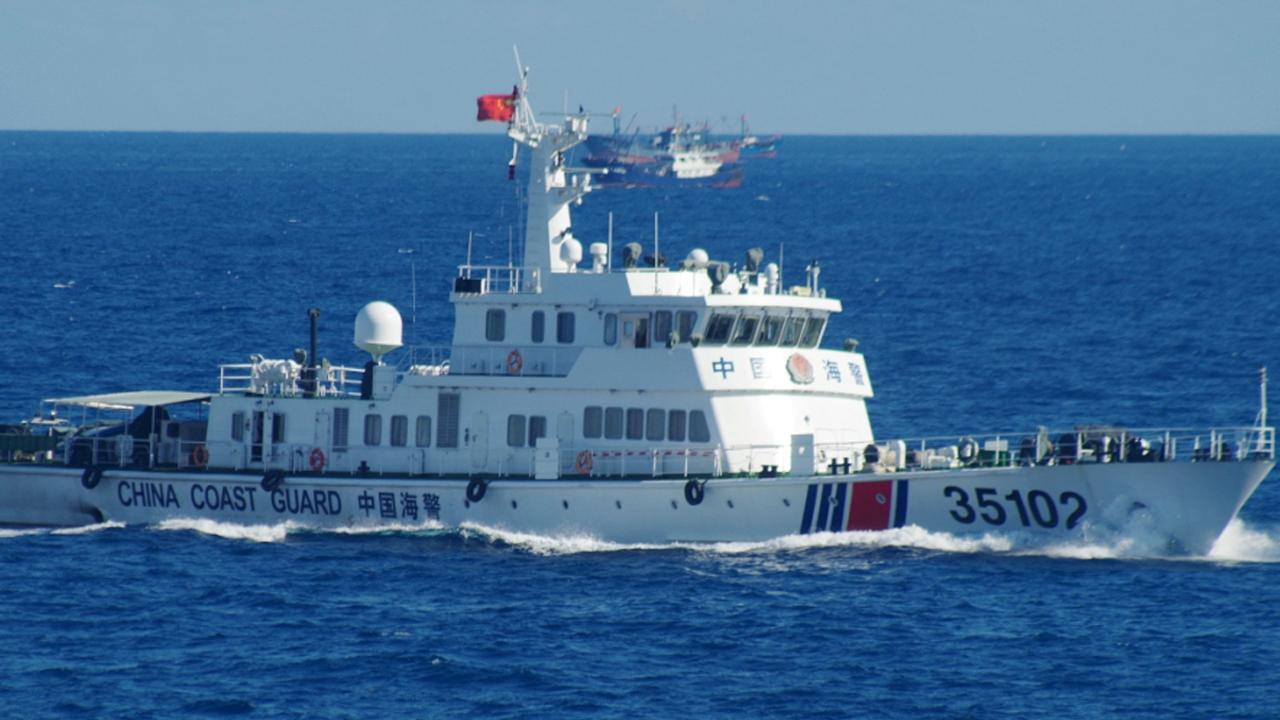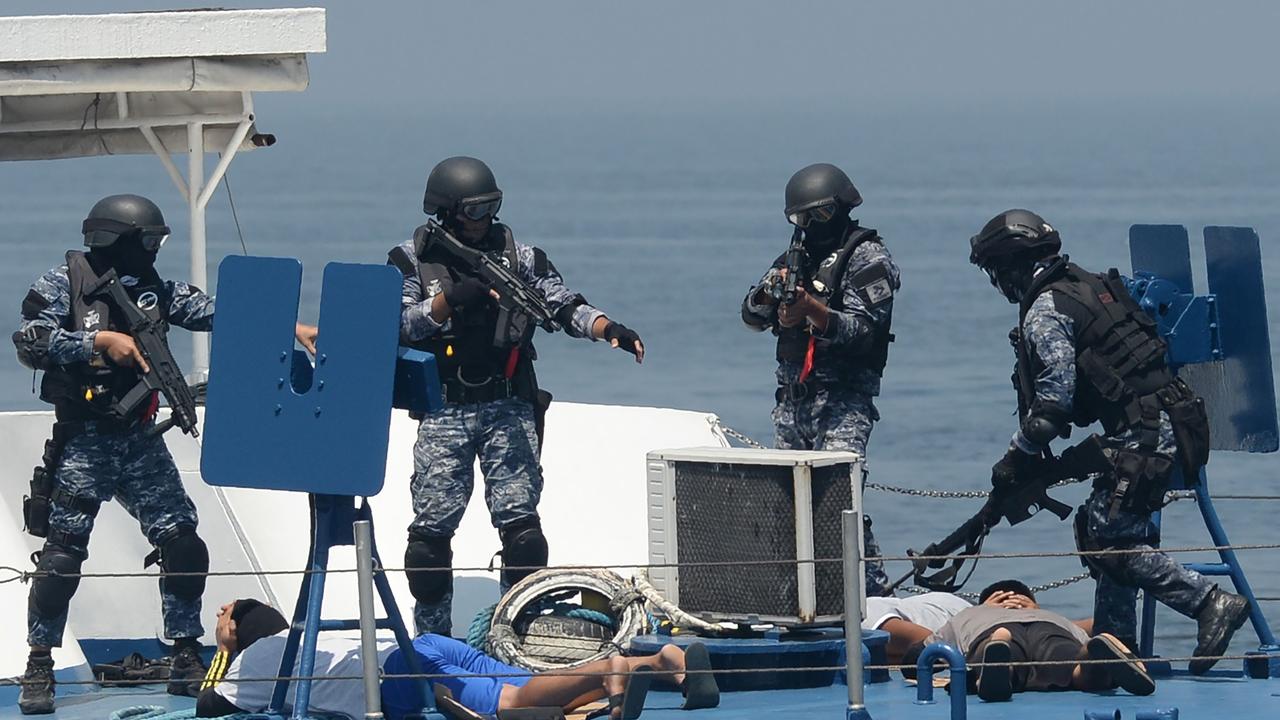South China Sea tensions at boiling point as Beijing tells Coast Guard to shoot, Philippines reacts
China has made a “threat of war” over its arbitrary borders in the South China Sea. Beijing said it will “take all necessary measures” in the conflict.
The South China Sea is reaching boiling point. Beijing has told its Coast Guard to shoot at any vessel inside its arbitrarily declared ‘nine-dash line’ borders. Now the Philippines says its navy will shoot back.
Philippines Foreign Affairs Secretary Teodoro Locsin Jr this week vowed any response would bring serious consequences.
“So far there has been no incident. If there is an incident, I can assure you there will be more than just a protest,” Mr Locsin told local media.
He was commenting after issuing a formal diplomatic protest against what he called a “verbal threat of war”.
“Initially I said, you make a law, a domestic law that’s nobody’s business, however, on reflection, you realise that this law can be applied to areas that they claim are theirs … they will fire if there’s resistance. That to me is a threat of war,” he said.
RELATED: China’s brutal plan to become a superpower

Japan is also bracing for an escalation of conflict around its islands in the East China Sea.
Beijing wants them. It regularly sends its fishing militia and coast guard into their exclusive economic zone.
Japan’s Defence Ministry says Beijing’s “open fire” law “could shake the order based on international law”.
FIGHTING WORDS
Beijing’s embassy in Manila has attempted to deflect criticism and concern.
But the law speaks for itself. It orders China’s navy and coast guard to “take all necessary measures, including the use of weapons when national sovereignty, sovereign rights, and jurisdiction are being illegally infringed upon by foreign organisations or individuals at sea”.
The Manila embassy says the law isn’t aimed at any one country. It says it conforms to international conventions.
“Many countries have enacted similar legislation. The Philippine Coast Guard (PCG) Law of 2009 established the PCG as an armed and uniformed service. None of these laws has been seen as a threat of war,” an embassy statement reads.
South Korea, Japan, Taiwan, Vietnam, Malaysia, Indonesia and the Philippines disagree.
RELATED: Aus joins US in ‘worst-case’ war game
They all hold territorial stakes in the East and South China Seas as defined by the United Nations’ international law of the sea. They all know Beijing wants them out.
That makes their ships and outposts targets.
“It was carefully pointed out that there is no exact delineation of jurisdiction. Yeah, sure, there’s no exact delineation of jurisdiction in the law, but what if there is? There could be, so my protest stands,” Mr Locsin said.
The law has been met with widespread concern within the Philippines.
“I hope we’re not looking at a country that has turned rogue, that has turned to be unilaterally aggressive in terms of making sure that they assert their claims in a violent manner,” Senator Richard Gordon told the Filipino parliament.
SECOND FRONT
China’s coast guard entered waters around the Senkaku Islands earlier this month, aggressively approaching Japanese vessels. Last year, China sent its coast guard and fishing militia into the Japanese territory for 333 days.
It was seen as an open act of defiance and intimidation.
RELATED: China and Russia’s aggressive master plan

Units of Japan’s coast guard often meet these intrusions. But its civilian force is strictly limited in its use of weapons and international law restrains its use in “military activities”.
If Chinese white-hulled coast guard ships open fire, Japan’s grey-hulled navy will have to respond.
And that would represent a significant escalation.
Foreign Minister Toshimitsu Motegi told a news conference earlier this month that Beijing “must not apply the law in a way that goes against international law”.
But Beijing has ignored rulings by international courts and committees, insisting the territories belong to it – under international law. China’s foreign ministry spokesman Wang Wenbin declared the Senkakus to be “China’s inherent territory” earlier this month. “China Coast Guard patrols and law enforcement activities in the islands’ waters are legitimate and lawful measures to safeguard sovereignty.”
Japan disagrees.
Its National Security Council has since met to discuss its response to Beijing’s potentially deadly orders. Among its options are increasing the presence of Japanese warships around the islands.
But that could come at a cost.
“We’d fall into a trap set by China,” a senior Defence Ministry official told local media.
GREY ZONE
China’s white-hulled Coast Guard is the largest in the world. It also features enormous, heavily armed ships.
Unlike much of the rest of the world, it’s not a civilian policing force. It’s wholly run and operated by the People’s Liberation Army Navy (PLAN) under the Communist Party’s Central Military Commission’s orders.
Which is why it’s often referred to as China’s “second navy”.
United States President Joe Biden has reassured Japanese Prime Minister Yoshihide Suga that their mutual defence treaties include the Senkaku Islands’ sovereignty. He reassured Mr Suga of Washington’s “unwavering commitment to the defence of Japan”.
RELATED: China on the brink of ‘major crisis’

Mr Biden also sought to reassure the mostly Beijing-friendly Philippine President Rodrigo Duterte that Washington supported its rights to much of the Scarborough Shoal and South China Sea.
He reaffirmed Washington’s commitment to Manila under their Mutual Defence Treaty (MDT).
But Manila remains worried.
Defence Secretary Delfin Lorenzana has said he doesn’t believe China will fire upon unarmed Filipino vessels.
“My only fear is that the navies of other nations will have a shooting war and if that happens, because of the (Mutual Defence Treaty), we will be involved whether we like it or not.”
This week, he ordered his navy not to participate in naval drills with the US and other Asian nations in the South China Sea.
“Firstly, it’s not to antagonise China because China is watching us here and a lot of things could be done to us by the Chinese government if they are antagonised,” he said. “I told Secretary Austin, we don’t want anything – miscalculations or accidents – happening in the South China Sea because we are right smack in the centre if it happens.”
Jamie Seidel is a freelance writer | @JamieSeidel




